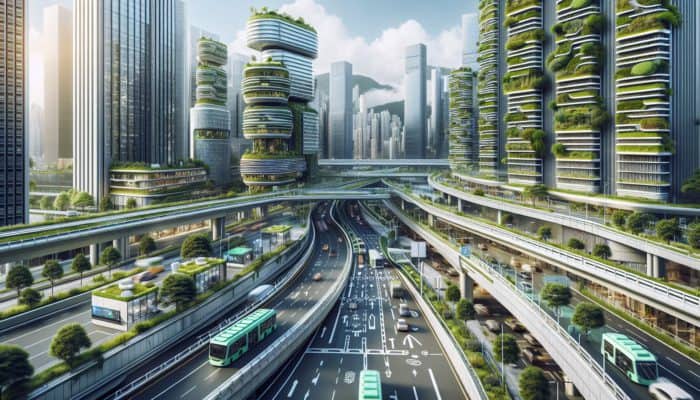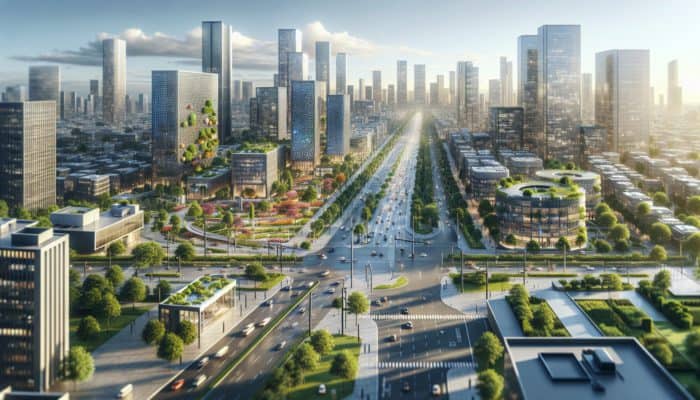Enhancing Urban Life Through Effective Noise Camouflage
What Constitutes Urban Noise Camouflage?

Urban Noise Camouflage: Urban noise camouflage is a crucial strategy that enhances the quality of urban living by utilizing a range of advanced techniques and innovative technologies to mitigate or reduce unwanted sounds. With the increasing urban density, the challenge of noise pollution has escalated, necessitating the adoption of effective solutions to mitigate its impact. Common contributors to urban noise include:
- Traffic and transportation
- Construction activities
- Public transport systems
- Emergency vehicle sirens
- Street performances and community events
- Industrial operations
- Airplane noise from overhead flights
- Urban nightlife and entertainment venues
By effectively masking these disruptive sounds, urban noise camouflage plays a crucial role in creating a more tranquil environment, enabling residents to engage more fully and enjoyably in their daily activities.
What Are the Fundamental Principles of Noise Camouflage?
The manipulation of sound is a scientific discipline that lies at the heart of urban noise camouflage, employing principles such as sound absorption and diffusion to design quieter urban landscapes. Key principles include:
- Sound Absorption: The use of materials that absorb sound waves, reducing their intensity and overall impact.
- Sound Diffusion: The technique of dispersing sound waves across a wider area to lessen the strength of particular noise sources.
- Barrier Construction: Building physical structures that obstruct sound paths, effectively shielding areas from noise.
- Active Sound Management: Implementing technology that dynamically adjusts noise levels based on real-time data.
- Natural Soundscaping: Promoting the growth of vegetation to inherently absorb and mitigate noise.
These principles provide a comprehensive framework for understanding how urban environments can be transformed into serene spaces, thereby enhancing the overall well-being of their inhabitants.
How Has Noise Camouflage Evolved?
The evolution of noise camouflage is a captivating narrative that mirrors societal changes and technological progress. Early methods relied on simplistic barriers, such as walls or fences, that aimed to block sound, primarily in residential settings. As urbanization increased and issues related to noise interference became more pronounced, strategies evolved to become increasingly sophisticated. The introduction of advanced soundscaping techniques, which involve intricate sound manipulation through both natural and artificial means, represents a significant advancement in this field. This historical progression highlights humanity’s continuous quest to find equilibrium in densely populated areas where noise remains a constant challenge.
Insights from Experts on Urban Noise Camouflage

What Are the Cutting-Edge Innovations in Urban Noise Camouflage?
Recent innovations in urban noise camouflage have fundamentally changed how urban planners and architects tackle the issue of sound pollution. At the forefront of these advancements are smart materials that can adjust to environmental variations. For example, certain materials can modify their sound absorption capabilities based on factors such as humidity or temperature, thereby guaranteeing optimal performance across diverse conditions. Additionally, AI-driven sound management systems are becoming increasingly instrumental, utilizing real-time data to modify soundscaping strategies dynamically. This level of responsiveness not only enhances acoustic comfort but also increases the efficiency of sound management, resulting in environments that can adapt to a variety of factors.
How Do Experts Effectively Implement Urban Noise Camouflage?
Experts employ a multifaceted strategy to implement urban noise camouflage, seamlessly integrating urban planning with groundbreaking technology. The implementation process typically involves several actionable steps:
1. Conducting comprehensive noise assessments to identify specific sound-related challenges within a given area.
2. Developing bespoke solutions that combine both natural elements and technological innovations.
3. Engaging community stakeholders to ensure that proposed solutions resonate with residents’ needs and preferences.
4. Continuously monitoring and adapting strategies over time to sustain acoustic effectiveness.
These strategies blend technical expertise with community involvement, ensuring that urban noise camouflage initiatives are not only efficient but also sustainable and widely accepted.
What Real-World Examples Highlight Urban Noise Camouflage?

Real-world implementations of urban noise camouflage provide invaluable insights into its effectiveness and practicality. A notable example is the establishment of sound barriers along major highways in cities such as Los Angeles, where these noise walls have significantly mitigated traffic noise impacting nearby neighbourhoods. Another prime example is the creation of green roofs in urban settings, which not only enhances air quality but also serves as effective sound insulation. Furthermore, cities like Zurich have integrated active noise cancellation technologies within public transport systems, resulting in quieter commuting experiences. These successful initiatives highlight the potential of urban noise camouflage to improve urban living conditions significantly.
What Challenges and Future Prospects Are Associated with Urban Noise Camouflage?
Despite the promising advancements associated with urban noise camouflage, numerous challenges persist. One significant hurdle is the inherent complexity of urban environments, where a multitude of diverse noise sources interact in unpredictable manners. Additionally, funding limitations often hinder the implementation of extensive noise reduction measures. However, experts forecast that future trends will shift towards more comprehensive solutions, merging technology with community-driven initiatives. As urban landscapes continue to evolve, the adoption of innovations such as AI and smart materials will be crucial in overcoming these challenges, ultimately fostering quieter and more liveable urban spaces.
What Advantages Does Urban Noise Camouflage Offer?
Health Improvements Linked to Reduced Noise Levels
The health benefits associated with reducing urban noise are extensive and multifaceted. Research consistently indicates that lower noise levels correlate with enhanced mental and physical well-being. Specifically, noise reduction contributes to lower stress levels, which in turn lead to a wide range of health improvements. These benefits encompass:
- Decreased blood pressure and heart rate
- Enhanced quality of sleep
- Reduced occurrences of anxiety and depression
- Improved cognitive functions and focus
By prioritising urban noise camouflage, cities can cultivate environments that encourage healthier lifestyles, thereby enhancing overall public health outcomes.
Improving the Quality of Urban Living
Urban noise camouflage plays a vital role in significantly enhancing the quality of life within urban areas. Quieter environments create more opportunities for social interactions and community engagement. For instance, parks and recreational spaces become increasingly appealing when noise levels are effectively managed. As a result, residents can partake in outdoor activities, which enriches their overall urban experience. Additionally, reduced urban noise contributes to more pleasant commuting experiences, ranging from quieter public transit systems to less intrusive traffic sounds. This transformation ultimately makes cities more enjoyable places to live, work, and socialise.
Economic Benefits Associated with Noise Reduction
The implementation of urban noise camouflage presents substantial economic advantages that extend far beyond merely improving resident comfort. Quieter environments can lead to an increase in property values, as desirable neighbourhoods become more appealing to prospective homeowners. Furthermore, diminished noise pollution can stimulate tourism, attracting visitors to cities renowned for their livability. The economic ramifications can be considerable, with studies indicating that investments in noise reduction strategies can yield significant returns, fostering vibrant urban centres that invigorate local economies.
How Is Urban Noise Camouflage Effectively Achieved?
Understanding Sound Masking Techniques
Sound masking techniques are integral to urban noise camouflage, effectively diminishing the prominence of unwanted noises. This process involves layering ambient sounds that are more harmonious to the ear, thereby creating a more pleasant auditory environment. For instance, the soothing sounds of water features in parks or the gentle rustling of leaves can effectively mask more disruptive noises such as traffic or construction sounds. By introducing these aesthetically pleasing soundscapes, urban planners can cultivate environments that not only mitigate noise but also enhance the natural beauty and tranquillity of urban settings.
Utilising Physical Barriers and Soundproofing Solutions
Physical barriers and soundproofing materials are crucial components of urban noise mitigation strategies. These components are crucial in blocking and absorbing sound waves, thereby effectively reducing their impact on urban residents. Techniques may range from erecting sound walls in high-traffic areas to employing specialised soundproofing materials within residential buildings. By incorporating these measures, cities can create quieter zones that offer refuge from the incessant noise typical of urban life, thereby enhancing the overall living conditions for their residents.
Implementing Active Noise Cancellation Technologies
Active noise cancellation systems represent a pioneering approach to tackling urban noise pollution. These innovative systems generate sound waves that are out of phase with unwanted noise, effectively neutralising it. This technique has gained traction in various urban applications, ranging from public transportation systems to bustling public spaces. As technology advances, active noise cancellation offers a high-tech solution that complements traditional noise reduction methods, resulting in quieter and more enjoyable urban environments.
Research-Driven Advantages of Urban Noise Camouflage
Investigating the Link Between Noise Reduction and Well-being
Numerous studies have highlighted the significant benefits associated with reducing urban noise exposure. Research findings indicate that decreased noise levels can lead to marked improvements in overall well-being. Key insights reveal that individuals living in quieter environments tend to report higher life satisfaction and lower incidences of stress-related health issues. The positive correlation between noise reduction and well-being highlights the importance of investing in urban noise mitigation as a public health priority, thereby paving the way for a healthier urban lifestyle.
Effects on Urban Wildlife and Ecosystem Health
Urban noise camouflage not only benefits human populations but also has a significant impact on urban wildlife. Excessive noise can disrupt communication among species, interfere with mating rituals, and elevate stress levels in animals. By implementing effective noise reduction strategies, urban areas can create habitats that are more conducive to wildlife flourishing. This dual focus on human and environmental health highlights the comprehensive benefits of urban noise mitigation, contributing to the sustainability of urban ecosystems.
Long-Term Impacts of Noise Camouflage Initiatives
Long-term studies reveal that the sustained application of urban noise camouflage can result in lasting enhancements to urban environments. Projects that consistently integrate noise reduction strategies over time demonstrate significant decreases in noise pollution, leading to healthier and more liveable urban spaces. These enduring benefits also extend to economic growth, as quieter environments become increasingly appealing to both residents and businesses alike. Consequently, a continued commitment to urban noise camouflage can shape the future of cities, promoting both well-being and economic vitality.
Economic Gains from Implementing Noise Camouflage
The economic benefits associated with urban noise camouflage are noteworthy. By reducing noise pollution, cities can enhance property values, attract investment, and stimulate local economic growth. Moreover, businesses situated in quieter environments frequently experience increased patronage, as consumers are drawn to more pleasant shopping and dining experiences. The overall economic impact of noise reduction is significant, highlighting the critical importance of prioritising urban noise camouflage initiatives within broader urban development strategies.
Fostering Community Health and Social Cohesion Through Noise Camouflage
Noise camouflage can play a crucial role in enhancing community health and nurturing social cohesion. Quieter urban spaces encourage community interaction and involvement, fostering a sense of belonging among residents. As noise levels decrease, public areas become more welcoming, facilitating social gatherings and recreational activities. The resulting social benefits contribute to a more interconnected urban environment, where residents feel empowered to actively participate in their communities actively, ultimately leading to an improved quality of life for all.
Strategically Implementing Urban Noise Camouflage Solutions
Key Planning and Design Considerations for Noise Camouflage
Successfully implementing urban noise camouflage requires meticulous planning and design considerations tailored to meet the specific needs of different urban locales. Essential factors include gaining a comprehensive understanding of the particular noise challenges present and identifying suitable solutions for each unique location. Engaging stakeholders and community members throughout the planning process ensures that proposed solutions are both practical and widely accepted. Additionally, integrating noise camouflage strategies into existing urban infrastructure can enhance their effectiveness, allowing them to blend seamlessly into the urban landscape.
Emerging Technological Solutions for Effective Noise Camouflage
A variety of technological solutions are available to implement urban noise camouflage effectively. These solutions range from traditional sound barriers to more intricate sound management systems that utilise real-time data analysis. Emerging technologies, such as smart materials that can adapt to environmental conditions, are rapidly gaining traction. By harnessing these innovations, urban planners can create adaptive environments that respond dynamically to fluctuating noise levels, thereby ensuring the sustained effectiveness of noise reduction strategies.
The Importance of Community Engagement in Noise Reduction Efforts
Community involvement is vital for the success of urban noise camouflage projects. Actively engaging residents in the planning and implementation phases helps ensure that solutions address their specific needs and preferences. Community workshops, surveys, and public forums can facilitate open discussions about concerns related to noise and potential solutions. By cultivating a collaborative approach, urban noise camouflage initiatives can garner broader support and be more effectively woven into the urban fabric, ultimately enhancing their impact on the community.
Frequently Asked Questions About Urban Noise Camouflage
What is urban noise camouflage?
Urban noise camouflage encompasses a range of techniques and technologies designed to mask or diminish unwanted sounds in urban settings, thereby enhancing the overall quality of life for residents.
How does sound masking operate?
Sound masking works by overlaying ambient sounds to lessen the prominence of disruptive noises, thereby creating a more enjoyable auditory environment.
What health improvements are associated with reduced urban noise?
Diminished urban noise can lead to lower blood pressure, improved sleep quality, and reduced stress levels, ultimately contributing to better overall mental and physical health.
Can urban noise camouflage positively impact wildlife?
Absolutely, by reducing noise pollution, urban noise camouflage can facilitate better communication among wildlife species and decrease stress levels, fostering healthier ecosystems.
What are some illustrative examples of noise camouflage initiatives?
Examples include the construction of sound barriers along highways, the implementation of green roofs, and the incorporation of active noise cancellation systems in public transportation, all of which contribute to quieter urban environments.
What challenges are faced in the implementation of noise camouflage?
Challenges encompass the complexity of urban environments, limitations in funding, and the necessity for ongoing community support to ensure effective noise reduction strategies.
How does noise reduction affect property values?
Quieter environments generally lead to increased property values, as desirable neighbourhoods become more appealing to potential homeowners and businesses.
What technologies are utilised for noise reduction?
Technological solutions range from traditional sound barriers to innovative smart materials and AI-driven sound management systems that adapt to varying noise conditions.
Why is community involvement crucial?
Community involvement ensures that noise reduction solutions align with residents' needs and preferences, fostering acceptance and support for urban noise camouflage initiatives.
What are the long-term advantages of noise camouflage?
Long-term advantages include sustained reductions in noise pollution, improved urban health, and increased economic growth, all of which contribute to the overall livability of cities.
Explore our world on X!
Solar Generator Reviews: Your Ultimate Guide
Comprehensive Guide to Solar Generators What Exactly Are Solar Generators? Solar Generator Reviews: Solar generators are cutting-edge technology designed to capture and convert sunlight into usable electricity effectively. These remarkable devices comprise solar panels that absorb sunlight, batteries that store the converted energy, and an inverter that converts the stored direct current (DC) electricity into […]
Wildfire Defensible Space: Protecting Your Home
Crafting Effective Wildfire Defensible Space for Your Home What Is the Concept of Wildfire Defensible Space? Wildfire Defensible Space: A carefully managed, strategically designed area surrounding homes and properties designed to reduce the risk of fire damage significantly. This critical concept is essential for safeguarding structures, particularly in regions vulnerable to wildfires. Establishing defensible space is […]
Water Filter Comparisons: Your Ultimate Guide
Comprehensive Overview of Water Filter Types Understanding Reverse Osmosis Systems for Optimal Water Purity Water Filter Comparisons: Reverse osmosis (RO) systems are among the most sophisticated technologies available for water filtration. By employing a semipermeable membrane, these systems effectively eliminate a wide range of contaminants, including salts, heavy metals, and microorganisms. The filtration process involves […]
Water Collection Systems: Essential Solutions for Sustainability
Comprehensive Overview of Water Collection Systems What Exactly Are Water Collection Systems? Water Collection Systems: Water collection systems encompass a variety of innovative technologies and methodologies specifically developed to capture, store, and utilise water from diverse sources, with a primary focus on rainwater. These systems are crucial for the sustainable management of water resources, particularly in […]







